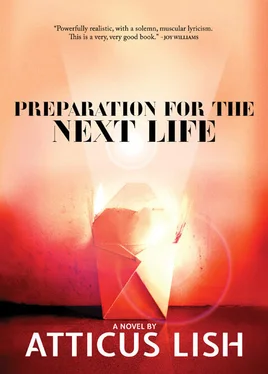Because the war?
Because war. Nobody can go. I have my wife. I cannot go. Even if I go alone, I cannot go. It’s very bad. You can’t believe what’s going on. If I tell you, you can’t believe. I don’t want to tell you what I know, what I see myself. Make you want to never see, to take out your own eyes. I can’t talk about it.
It’s a beautiful mountains.
It’s a beautiful country, my friend, but you cannot go. Maybe you know. Where you from? China? So maybe you don’t know. You know George Bush? He want to kill everyone. The Americans kill everyone. He kills more than the other one, bin Laden. That’s what he do to us. All my life, I love America, why you think I come here. Now Bush take it and he — the butcher flung his arms out — he do like that, throw in garbage, make it garbage. He don’t have to do it. Bin Laden is shit in my country, but now America is going down.
Let me tell you what happen, he continued. You see this one, the gas station when you come in? The one has all the flags. He was good people, nice guy. Muslim guy, right? Been here like me long time. After 9/11, one day, he disappear. Vanish. Gone. I used to see them all the time. Now I see his kid, nice kid. Why I don’t see your dad? My dad’s gone. What you mean gone? Gone, he says. I think they take him. Some people say he get in a car. For two years, disappeared.
Don’t tell me that.
It’s Homeland Security. Happen right here. The family put up pictures and everything. It kill them. All their face are falling down. You know where he is? The whole time he is right here in Queens. Nobody can see him and he is right there, right there in Queensboro Plaza. They got a building it looks like the post office. By the time, they know about it, they put him in another jail in Texas. Five years. When the family say, okay, let’s go to court — you think he’s done something — No. We going to keep him. No, we will send him to the Middle East.
Five years, she said. I don’t know if I can survive. When I was in jail, it was very hard for me.
They catch you for what?
For immigration.
By the greatness of God they let you out.
Yes, thank God. Now I am trying to fix my identity.
You don’t have the…
No. I have to fix this problem, she said. And she began to let her worries out for him to hear, since he was willing to listen. I cannot make money. I have to pay the lawyer. The lawyer is more money. It’s bad for me.
What’s your work?
Restaurant.
Chinese restaurant?
Yes. She cried a little talking about it, and wiped her eyes. My boss take the money.
Tesha sighed as he listened to her and felt helpless. I wish my wife was here. Sarah! The problem was that his wife would not understand her, because his wife spoke Tarjeek. His wife was at the Friday prayers.
Who’s your boss, what is he? Muslim? Chinese? No offense, but Chinese people — a lot of my customer Chinese, so I got to be careful — but Chinese people are cold.
I know, she said. Everything is business to them.
He gave her bread, insisting that she take it even after she refused, and he repeated his wish that his wife were here. Also, he had yogurt, if she wanted it, and he directed her attention to where he kept it in the small dark refrigerated case. For bread, he had the huge one like Afghanistan, and the little one too, like this, like Turkish pita. Whatever you need.
And another thing — this was important: A lot of people came to his store, he said. Here in the doorway, he had a bulletin board where they put up messages if they needed help. You could find exchange, he said. You can leave a note to ask for help.
He had a cardboard shelf, the kind that folds up like a box and sits on the floor, that held business cards and free newspapers. He told her to take an immigration attorney’s card. Rahmat, she said, taking a card and holding it with her bread. And he had these — and he pointed out a pile of small folded newspapers in Urdu and Chinese.
My wife makes samsa. She cut it up the ingredients very fine like this — and he sawed his hand across his palm. Beautiful. Almost like home. You gotta try it. If you have time, come back.
His wife came in through the back door and Tesha spoke to her in Tarjeek. The woman came around the counter in her black polyester robe, bringing Zou Lei a cup of water. At the same time, another customer was coming in and the butcher had to speak with him, so that was how Zou Lei finished talking with him. He put his hand on his heart and told her to come back.
Rahmat, she said.
His wife Sarah had an idea and took her by the hand out onto the hot street and led her to a house next door to a boarded-up building with weeds coming through the boards. She pulled Zou Lei towards the door through which you could see a rectangular carpeted room, empty shoes and sandals just inside the door. The entrance was propped open with a trash can. Men in robes and slacks were converging on this place from all over the street. Zou Lei saw their beards and realized it was a mosque. A man stepped inside and took his sandals off and went in to join the others kneeling in front of the black flag and the dais.
The butcher’s wife gave her to a man and wished her well. The man guided her down to the women’s entrance, a separate doorway in what appeared to be a residential house, and told her to go downstairs. Zou Lei went inside, seeing a staircase and another pile of shoes and smelling a heavy smell of air freshener. Through a doorway she could see the men entering the mosque on the first floor. She removed her sneakers and went down the stairs and into the basement.
The basement was a closed rectangular room draped with strings of plastic flowers and enormous black flags emblazoned in golden script. One end of the room was rigged with a shower curtain rod and wires. There were spotlights bolted to the ceiling, as if the room was used to make videos, but they were off. Women sat on the carpeted floor, their legs folded like deer, and faced a television resting on a sequined dais. The television was broadcasting a live video image of what was happening in the men’s prayer room upstairs.
They told her to go into the bathroom and purify herself. She was observed from the doorway as she washed her hands with gooey liquid soap. A woman muffled in black indicated, Your feet too. Zou Lei, who was thirsty from running, drank from the tap. Your feet, the woman insisted, her veil edged in silver thread. Zou Lei put her foot in the sink and washed it.
When she was done, she was told she could take her place with the others, so she went out and sat on the carpet at the back of the room behind them all. She sat one knee bent, her tanned face and bare calves burnished and dark, the sweat on her forehead gleaming and the crotch of her tight denim leggings wet, and waited.
The carpet was divided into rectangles and you sat within your rectangle. Overhead, the first floor was filling up with men, who could be heard through the ceiling as they came in and lined up in rows. They handed out plastic prayer beads and round flat stones and you placed the stone in front of you in the rectangle in which you sat. The women watched what was happening on the television, which was trained on the figure of a man in a black turban beneath a spotlight. He stood up and the TV showed the men standing up. The women stood up and Zou Lei stood up with them. Someone began to sing upstairs and she watched the back of his head on the monitor as he sang towards the black banners.
Allahu akbar! everyone cried out on both floors of the building. Allahu akbar, Zou Lei said.
The singing stopped and the mullah turned around. He was a man of medium height in his sixties with a gremlin-like face surrounded by a white beard that made it look as if you were seeing the head of a brown figurine in white wrapping paper. A microphone scratched and thumped. He spoke for several minutes, moving his hands, flexing his fingers, sometimes raising an index finger as he lectured. On each hand, he wore a ring with a large oval stone in it.
Читать дальше












